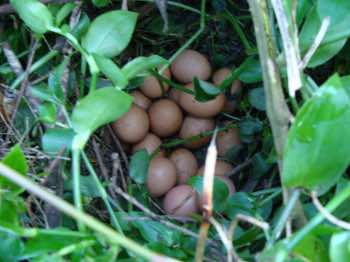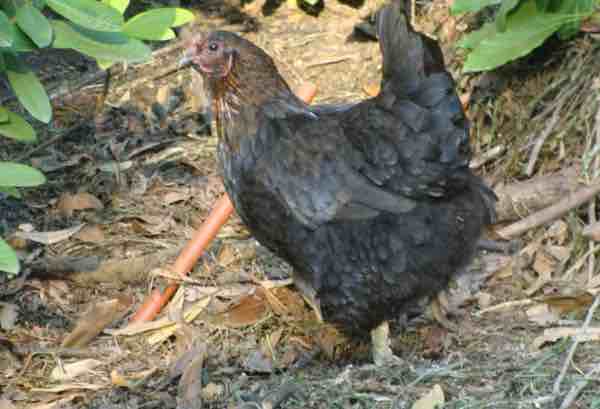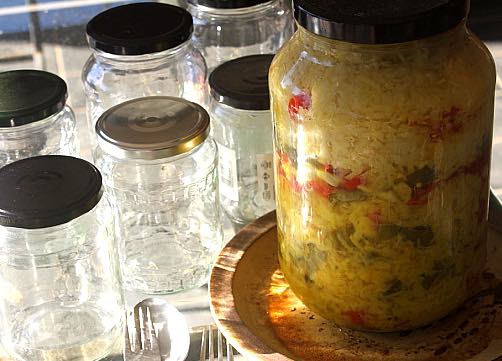Should one refrigerate eggs?
Should one refrigerate eggs is a question many may be considering; a Salmonella infection is not fun. Like most controversial subjects it depends on a number of factors.
The first to consider is whether these are your own free-range birds or have they come from the supermarket? It makes a world of difference to both the quality of the egg and how safe it is to consume.
There is a general terror of viruses, bacteria and yeast cells. Yes there are pathogens but we are surrounded by a great host of friendly bugs that are extremely beneficial to our bodies; keep them happy. They will then multiply and usually overwhelm the baddies when they come knocking on the door.
Known as the microbiome these friendly bugs are the first line of defence against invading pathogens.

Free-range birds will sometimes make their own hidden nests. Fed up with us for stealing their eggs, when they want to raise a family they may take to the bushes. Although these might be older they are generally far cleaner.
"Betaine, a choline derivative, is important because of its role in the donation of methyl groups to homocysteine to form methionine."
- The Journal of Nutrition[7]
Eggs are an excellent source of choline which the body uses to detoxify homocysteine, a deadly breakdown product of protein metabolism. When raised it's associated with many very serious diseases.
Commercial eggs
Commercial eggs have usually been washed in a sanitizing solution and even pasteurised to minimise the risk of a Salmonella infection. However it removes the natural coating making them more porous and susceptible to the pathogens if not refrigerated.
Generally those who keep their own hens will eat the eggs almost immediately; those from the grocery story may lie around in the refrigerator or on the counter for weeks. This gives the pathogens time to multiply.
Much of the research has been done on eggs that are a few weeks old; no question of it, those that are kept in the refrigerator are safer. But how many homesteaders store them for such a long period?
Salmonella
Salmonella is a pathogen that is shed in the faeces of both humans and your own hens; exposure to infected water, salads[1] and dirty eggs raises the risk of the illness.
Severe diarrhoea, a high temperature and painful abdominal cramps are the common symptoms; those with a thriving diverse microbiome may have all of these signs or none of them.
Being a keeper of hens, I think I once was infected; the symptoms were unpleasant, lasted a few days and I recovered without medication. A daily dose of kefir, a probiotic easy to make in our own kitchens I believe was my saving grace.
A fresh egg

Without question chickens in the garden are hard work; not many will make the effort to have a fresh egg for one's baking or breakfast.
For those who do giving the eggs a quick wipe before immediate use in one's cooking means that the question, should a person refrigerate them hardly ever arises.
Homesteading has many advantages, perhaps none greater than the access to good food. Whether it is a freshly-picked lettuce or an egg straight from the hen house, we think it well worth the effort.
Those who only have access to what is being called industrial food know only too well they spend even more time consulting doctors and pharmacists. At our green home we choose rather to put our energy into growing fresh produce; should one refrigerate eggs never comes into consideration.
Should one refrigerate eggs?
Should one refrigerate eggs? It depends on a host of factors. If you want nice round yolks and thick viscous whites then it really has to be fresh; no better place than straight from your own hens.
Microbiome
If you're anxious about infectious diseases and we all should consider it, there is no better protection than making sure you have the full complement of friendly bugs in your alimentary canal. It should be very diverse; over a thousand different species. It will weigh an incredible two kilogrammes.
It is indeed amazing what is going on below the radar in the happy tum. Alas not many of us have this protection. Most of us have a depleted gutful of bugs; the antibiotics we are constantly exposed to, both from the pharmacist and in our food.
All the chemicals added by food companies to processed meals and artificial sweeteners also mess with the friendly bugs.
The solution is not yet more supplements which give only a very mediocre range of bacteria but fermenting your own probiotics; as many as possible for greater diversity. How to make kefir is something for all of us; it's incredibly simple.
Making an unpasteurised homebrew is rather more complex; that might be a honey beer or something exotic like this spicy peppadew mead. Yeasts form an important part of the microbiome; supply the friendly ones and you will not suffer from a Candida overgrowth.
Those enjoying probiotics such as these become far less fearful of bugs; questions like should one refrigerate eggs seem petty and will not get us worried and upset.

We are continually trying new fruits and vegetables for fermenting; chaote squash is free food in our garden. In South Africa we call it a susu; no one should go hungry. We enjoy one almost every day for five months and then extend the season by turning the huge surplus into a probiotic.
 Sauer-susu is a copy of the cabbage the Germans love to ferment
Sauer-susu is a copy of the cabbage the Germans love to fermentI personally have once in the thirteen years of keeping hens had what I think could have been a salmonella infection; it was unpleasant for a few nights but nothing else. Now I just wash my hands rather more thoroughly; and the eggs too. We eat them within a day or two so there's no question of whether we should refrigerate them or not.
This mead incidentally has been racked twice and is still bubbling very slightly. After the third it will be perfectly clear. It is a living probiotic. It is the ultimate natural wine, the taste to die for.
There are concerns about commercial alcohol; pasteurisation kills all the friendly yeast cells. Even as little as one glass of wine per week increases the probability of cancer. However Blue Zone folk drink several glasses of natural wine like this mead daily with their meals; and enjoy incredibly long and zestful lives.
Omega-3
Free range eggs have three times the omega-3 by the way; it's a vitally important fatty acid that helps prevent inflammation amongst many other things. The hens get it from plants such as purslane that grow prolifically in most gardens; we put it in our salads.
The omega-6 and 9 fatty acids are important too but should constitute no more than about 3% of our energy; on typical grocery store food where everything is steeped in sunflower and soybean oil it's much higher; that is inflammatory.
When browsing use right click and "Open Link in New Tab" or you may get a bad gateway signal.
The material expressed on this page is gleaned from the nutritional and environmental literature; it is clearly referenced. A plain distinction is made between the author's opinion and that which is scientifically proven. When in doubt consult your health professional.
To suggest a correction or clarification, write to Dr Bernard Preston here. Contact.
Newsletter
Our newsletter is entitled "create a cyan zone" at your home, preserving both yourself and Mother Earth for future generations; and the family too, of course. We promise not to spam you with daily emails promoting various products. You may get an occasional nudge to buy one of my books.
Here are the back issues.
- Lifestyle and ideal body weight
- What are ultra-processed foods?
- Investing in long-term health
- Diseases from plastic exposure
- Intensive lifestyle management for obesity has limited value
- A world largely devoid of Parkinson's Disease
- The impact of friendly bacteria in the tum on the prevention of cancer
- There's a hole in the bucket
- Everyone is talking about weight loss drugs
- Pull the sweet tooth
- If you suffer from heartburn plant a susu
- Refined maize meal and stunting
- Should agriculture and industry get priority for water and electricity?
- Nature is calling
- Mill your own flour
- Bake your own sourdough bread
- Microplastics from our water
- Alternative types of water storage
- Wear your clothes out
- Comfort foods
- Create a bee-friendly environment
- Go to bed slightly hungry
- Keep bees
- Blue zone folk are religious
- Reduce plastic waste
- Family is important
- What can go in compost?
- Grow broad beans for longevity
- Harvest and store sunshine
- Blue zone exercise
- Harvest and store your rainwater
- Create a cyan zone at your home
Did you find this page interesting? How about forwarding it to a friendly book or food junkie? Better still, a social media tick would help.
Address:
56 Groenekloof Rd,
Hilton, KZN
South Africa
Website:
https://www.bernard-preston.com